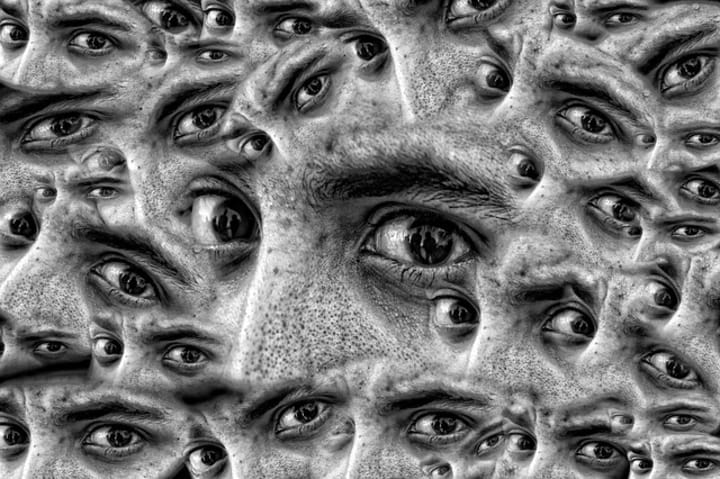
Welcome back! Good to see ya, nice to meet’cha, let’s dive right in! Today’s topic is solely focused on suspicion and how it can affect your social life and mental processes. Of course, it’s only reasonable that I explain how this topic popped into my head.
You see, kiddies, I get extremely suspicious when certain people ask me questions. Whether it’s a stranger or an acquaintance, there are just some individuals I feel should not be asking me things—no matter how innocent the question. Take this conversation, for instance:
I’m in the kitchen area at work, heating my lunch in a microwave.
Co-worker: Heating up your lunch?
Me: Yes.
Co-worker: What are you having?
Me: …Soup
Co-worker: What kind of soup?
Me: Homemade soup.
Co-worker: Well, what’s in it?
Me: ::shrugs:: Vegetables and broth.

It was almost as discomforting as this image.
Yes, I knew what he wanted when asking what kind of soup. And, yes, I knew exactly what was in it. Yes, Dave, seriously. I can put edible things together in a bowl and pour broth over it. Anyway, the problem was this: I didn’t want to answer. Similarly, I don’t want to answer when asked about my prior weekend or my plans for the upcoming weekend. I don’t know why. My only reasoning is: It’s none of this person’s business. The next minute, I’ll turn around and tell the withheld information to a different co-worker. And, I’m not the only one who does this.
For the most part, we all encounter people who rub us the wrong way, people we instantly don’t like without even a word exchanged. I believe the type of guarded suspicion some of us have when asked questions by certain people is a symptom of this. So, why are some people suspicious in this way, and why do certain people seem to rub us the wrong way?
Looking at the Science Behind Suspicion

Shown here: Not the wrong kind of rub.
Understanding suspicion through science is a good where to start with our conundrum. In order to figure out how people assess the credibility of others, scientists at the Virginia Tech Carilion Research Institute (VTC) investigated the parts of the brain that function in suspicion: the amygdala and the parahippocampal gyrus. The amygdala “plays a central role in processing fear and emotional memories and the parahippocampal gyrus […] is associated with declarative memory and the recognition of scenes,” according to an article featured on VTC’s website. The study went like this:
76 pairs of players, each with a buyer and a seller, competed in 60 rounds of a simple bargaining game while having their brains scanned [using an fMRI]. At the beginning of each round, the buyer would learn the value of a hypothetical widget and suggest a price to the seller. The seller would then set the price. If the seller’s price fell below the widget’s given value, the trade would go through, with the seller receiving the selling price and the buyer receiving any difference between the selling price and the actual value. If the seller’s price exceeded the value, though, the trade would not execute, and neither party would receive cash.
The outcome? According to Read Montague, director of the Human Neuroimaging Laboratory and the Computational Psychiatry Unit at VTC, and the leader of the study, “The more uncertain a seller was about a buyer’s credibility […] the more active his or her parahippocampal gyrus became.”
Knowing what parts of the brain are most active during a state of suspicion is the first step in understanding the emotion, as well as where the suspicion is based. Heightened activity in the amygdala would, theoretically, signify fear-based suspicion, while heightened activity in the parahippocampal gyrus would signify suspicion based on mistrust. Montague suggest the parahypocampal gyrus acts “like an inborn lie detector.”
“So, what?” you demand. “How is this actionable information and why should I care?” Good question! It just so happens that…
Suspicion Can Cost You Profit… and Worse

Not caring could make you turn out like Dave.
First of all, not everything is about you, my precious snowflakes. So, let’s look at the bigger picture. Like most things, suspicion in moderation can be quite good. What's the old saying? If it's based in the amygdala, it must be a survival instinct. What? That's not a saying? Daaaaaave!!!
Anyway, there is a line to how suspicious one should be. Being overly suspicious—either from fear or mistrust—can have negative consequences on financial success. According to Meghana Bhatt, one of the study’s authors:
People [taking part in the study] with a high baseline suspicion were often interacting with fairly trustworthy buyers, so in ignoring the information those buyers provided, they were giving up potential profits. The ability to recognize credible information in a competitive environment can be just as important as detecting untrustworthy behavior.
Not only can individuals with high baseline suspicion have a harder time achieving financial success, they can have a harder time achieving success in their careers. This can lead to a host of new problems, including an increase in stress and anxiety, as well as depression.
Speaking of the mental aspects, studies in suspicion can have implications for psychiatric disorders. “The fact that increased amygdala activation corresponds with an inability to detect trustworthy behavior may provide insight into the social interactions of people with anxiety disorders, who often have increased activity in this area of the brain,” explains Montague.
Sure, studies such as these could help pinpoint sources of certain psychiatric disorders, which could better help scientists nail down proper treatments. But, these types of studies could also help to create a treatment or healthy way in which to promote balance for those with high baseline suspicion. Perhaps a better question is: When my internal lie detector goes off, who should I trust?

Here’s an anxious kitten. You’re welcome.
About the Creator
RJ Plant
RJ Plant is a Birmingham, AL, native currently terrorizing Williamsburg, VA. She writes sci-fi and fantasy with thriller elements and has a fantastic library, as well as a strange love for science. Want more? Visit rachaelplant.com.






Comments
There are no comments for this story
Be the first to respond and start the conversation.